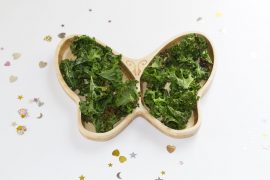- Optimise gut health
Gut health plays a crucial role in overall health, and imbalances in the gut microbiome can contribute to ‘mum brain’ – all thanks to the gut-brain axis. Simple dietary changes such as reducing processed sugar, enjoying three good meals per day, and limiting coffee to one per day before 10am can go a long way towards reducing brain fog and stabilising energy. The use of specific nutrients and pro/prebiotic strains can further improve gut function, depending on symptoms and your current health state.[8] - Reduce inflammation
The combination of an altered immune system during pregnancy, underlying inflammation and low serotonin levels can contribute to a range of health issues including ‘mum brain’ and postpartum depression. The good news is that we can reduce inflammation simply through dietary changes. Enjoying anti-inflammatory foods such as organic berries, vegetables of all different colours, extra-virgin olive oil, nuts and seeds, and fatty fish including salmon, mackerel, tuna, and sardines can be effective in reducing inflammation. Specific nutrients and herbal medicines offer further benefit here.[9] - Address environmental toxins
Constant, low level exposure to endocrine-disrupting chemicals such as phthalates, parabens and bisphenols (including BPA and ‘BPA-free’ plastics), interfere with hormones, can cause DNA damage and contribute to feelings of anxiety and depression. Making simple changes with skin care, makeup, deodorant, perfume, cleaning products and food storage containers can go a long way to supporting hormonal and mental health.[10]
‘Mum brain’ is a common challenge for many mothers – whether your child is a newborn, or whether your baby-now-adults have moved out of home. Irrespective of your current situation, know that incorporating these tips into your daily routine can help you stay mentally sharp, reduce stress, and enjoy the journey of parenthood.
References:
[1] DiNicolantonio, J.J., et al. The Importance of Marine Omega-3s for Brain Development and the Prevention and Treatment of Behavior, Mood, and Other Brain Disorders. Nutrients, 2020.PMID: 32759851.
[2] Moya, E., et al. Effect of postpartum anaemia on maternal health-related quality of life: a systematic review and meta-analysis. BMC Public Health, 2022. PMID: 35189871.
[3] Serrallach, O. Postnatal Depletion Cure. 2018.
[4] Obrochta, C.A., et al. Psychological distress in pregnancy and postpartum. Women and Birth, 2020. PMID: 32035798.
[5] Pitsillos, T., et al. Association Between Objectively Assessed Sleep and Depressive Symptoms During Pregnancy and Post-partum. Frontiers in Global Women’s Health, 2022. PMID: 35174357.
[6] Becker, L., et al. Physiological stress in response to multitasking and work interruptions: Study protocol. PLoS One, 2022. PMID: 35134093.
[7] Brik, M., et al. Social Support and Mental Health in the Postpartum Period in Times of SARS-CoV-2 Pandemic: Spanish Multicentre Cohort Study. International Journal of Environmental Research & Public Health, 2022. PMID: 36497529.
[8] Zhou, Y., et al. Fecal Microbiota Changes in Patients With Postpartum Depressive Disorder. Frontiers in Cellular & Infection Microbiology, 2020. PMID: 33134190.
[9] Achtyes, E., et al. Inflammation and kynurenine pathway dysregulation in post-partum women with severe and suicidal depression. Brain, Behaviour & Immunity, 2020. PMID: 31698012.
[10] Kim, J-H., et al. Impact of Endocrine-Disrupting Chemicals in Breast Milk on Postpartum Depression in Korean Mothers. International Journal of Environmental Research & Public Health, 2021. PMID: 33922135.
Georgia Hartmann is a Naturopath, Mum of two and Founder of Hormone Health Studio. Find out more about what they do on their website or contact Georgia at hello@hormonehealthstudio.com. You can also follow them on Instagram at @hormonehealthstudio.










